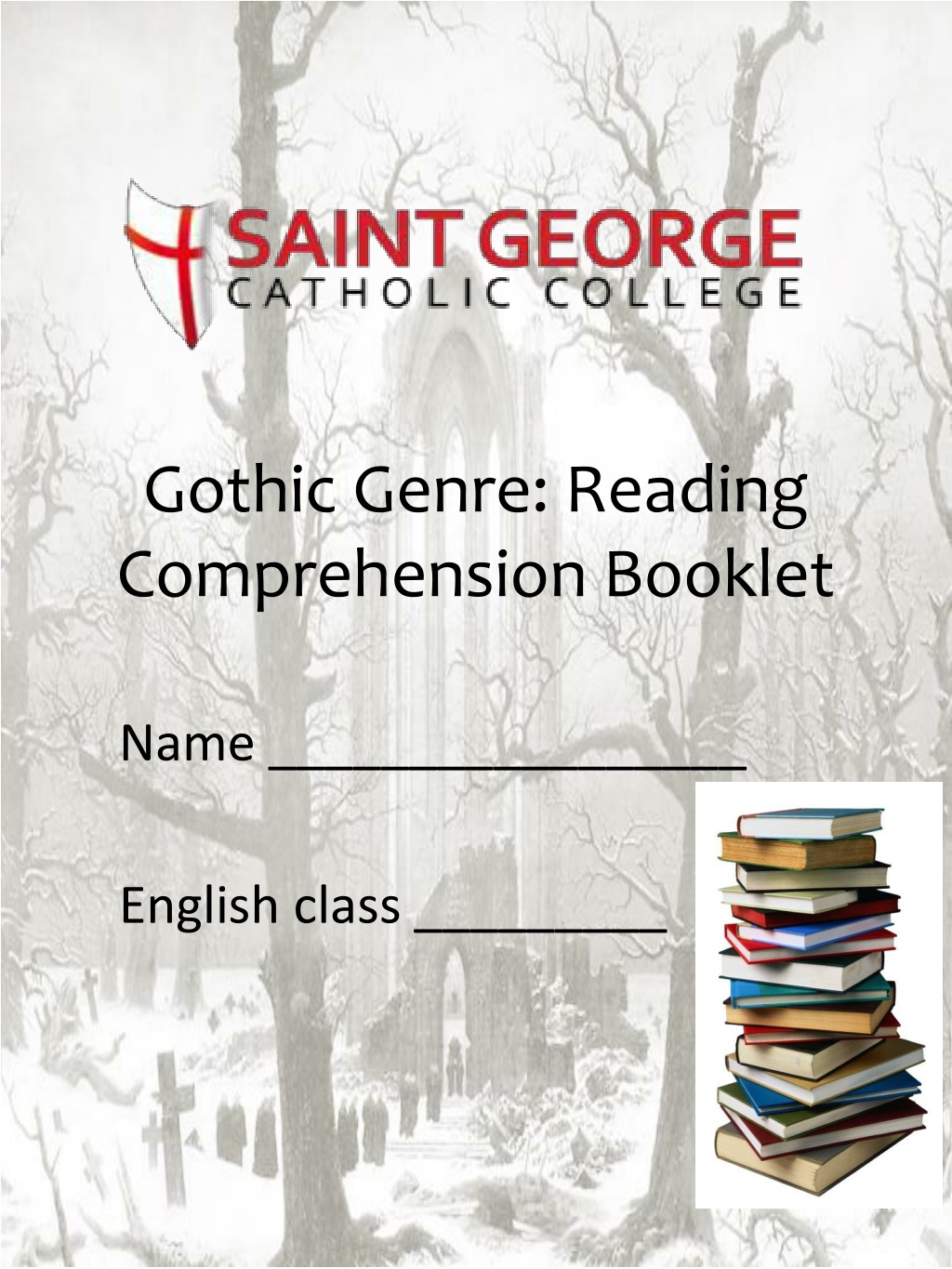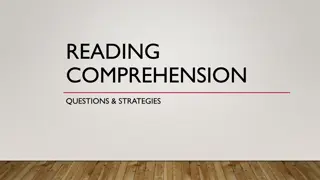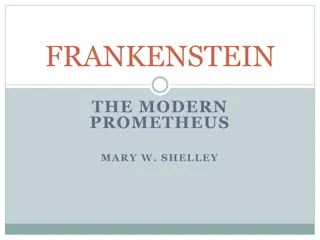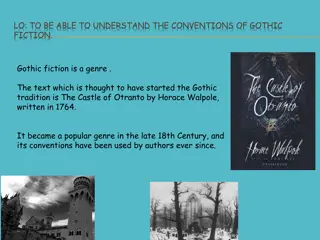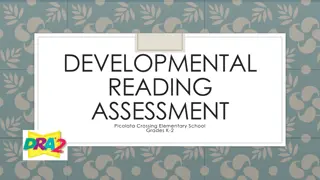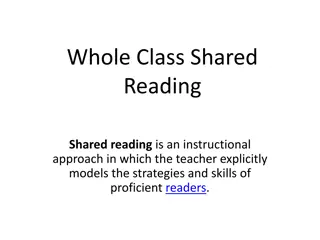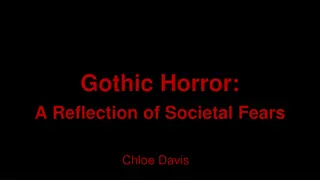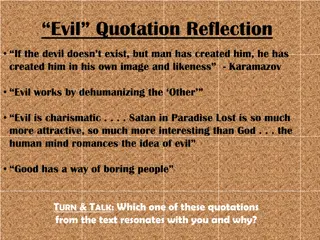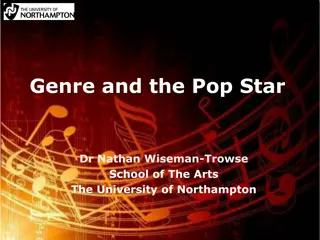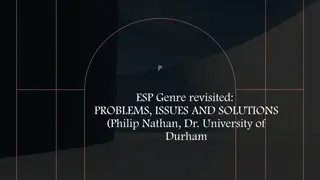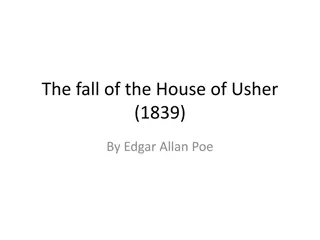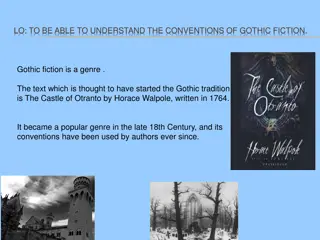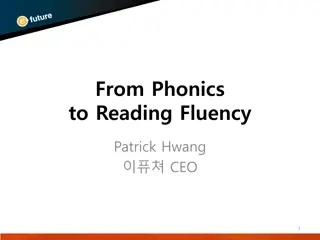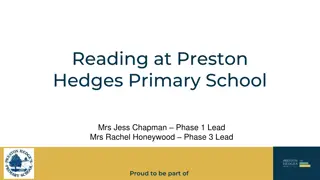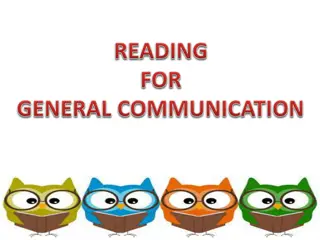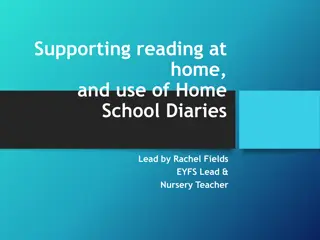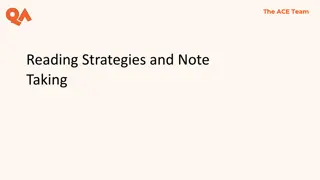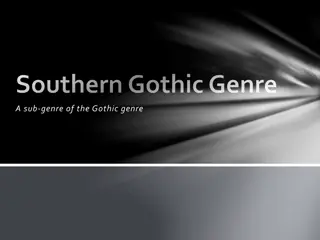Understanding the Gothic Genre Through Reading Comprehension Booklet
Dive into the mysterious world of the Gothic genre with a reading comprehension booklet featuring texts that will challenge your comprehension skills. Explore the eerie atmospheres, detailed descriptions, and captivating narratives that define this intriguing literary genre. Enhance your reading strategies and unlock the secrets hidden within each story to fully engage with the Gothic elements presented.
Download Presentation

Please find below an Image/Link to download the presentation.
The content on the website is provided AS IS for your information and personal use only. It may not be sold, licensed, or shared on other websites without obtaining consent from the author. Download presentation by click this link. If you encounter any issues during the download, it is possible that the publisher has removed the file from their server.
E N D
Presentation Transcript
Gothic Genre: Reading Comprehension Booklet Name _________________ English class _________
Reading Comprehension There are seven texts in this booklet. When you have completed the comprehension activities, complete the tracker below. This will be checked by your teacher. Text title Date of completion Checked Reading targets: 1. 2. 3. Feedback:
What are your key reading strategies?
The Boys Toilets by Robert Westall, From Ghost Stories Reading comprehension : Read the extract and answer the questions in as much detail as possible. Section 1: The January term started with a scene of sheer disaster. A muddy excavator as chewing its way across the netball-court, breakfasting on the tarmac with sinuous lunges and terrifying swings of its yellow dinosaur neck. One of the stone balls had been knocked of the gate posts, and lay in crushed fragments, like a Malteser trodden on by a giant. The entrance to the science wing was blocked with pile of ochreous clay, and curved glazed drainpipes were heaped like school dinners macaroni. The girls hung round in groups. One girl came back from the indoor toilets saying Miss Bowker was phoning the Council, and using words that Eliza Bottom had nearly been expelled for last term... The next girl came back from the toilets saying that Miss Bowker was nearly crying. Which was definitely a lie, because here was Miss Bowker now, come out to to address them in her best sheepskin coat. Though she was wearing fresh make-up, and her eyes were suspiciously bright, her famous chin was up. She was brief and, and to the point. There was an underground link in the central heating; till it was mended they would be using the old Harvest Road Boys school. They would march across now, by forms, in good order, in charge of the prefects. Section 2: Then the marching little columns came to a miserable little hump-backed bridge over a solitary railway line., empty and rusting. Beyond were the same kind of houses; but afflicted by some dreadful disease, of which the symptoms were a rash of small window- panes, flaking paint, overgrown funereal privet-hedges and sagging gates that would never shut again. And then it seemed to grow colder still, as the slum-clearances started, a great empty plain of broken brick, and the wind hit them full, sandpapering faces and sending grey berets cartwheeling into the wilderness.
uestions 1. What kind of atmosphere is built up in section 1? 2. Pick three images from section 1 that help to build up this atmosphere. Write down two ideas for each image what is the denotation? What is the connotation? 3. What mood and effect is created by the following quotes? a) a miserable little hump-backed bridge b) a solitary railway line c) houses...afflicted by some dreadful disease 4. How does the description of the weather add to the mood? 5. What does the word funereal suggest about the privet hedges? 6. Can you highlight any other language devices in this piece and explain their detonation and connotation?
Nothing to be afraid of by Jan Mark Reading comprehension : Read the extract and answer the questions in as much detail as possible. This extract is from the beginning of a novel Section 1: Robin won t give you any trouble, said Auntie Lynn. He s very quiet. Anthea knew how quiet Robin was. At present he was sitting under the table and, until Auntie Lynn mentioned his name, she had forgotten he was there. Auntie Lynn put a carrier bag on the armchair. There s plenty of clothes, so you won t need to do any washing, and there s a spare pair of pyjamas in case well, you know. In case... Yes, said Mum firmly [...] Mum almost told Auntie Lynn to stop worrying and have a good time, which would have been a mistake because Auntie Lynn was going up North to a funeral. Auntie Lynn was not really an Aunt, but she had once been at school with Anthea s mum. Robin was not anything much, except four years old, and he looked a lot younger; probably because nothing ever happened to him. Auntie Lynn kept no pets that might give Robin germs, and never bought him toys that had sharp corners to dent him or wheels that could be swallowed. He wore balaclava helmets and bobble hats i winter to protect his tender ears, and a knitted vest under his shirt in summer in case he overheated himself and caught a chill from his own sweat. Section 2: His face was as pal and flat as a saucer of milk, and his eyes floated in it like drops of cod liver oil; also with extract of milk, concentrated orange juice and calves-foot jelly. When you picked him up you expected him to squelch, like a hot water bottle full of half-set custard. Anthea lifted the table cloth and looked at him. Hello, Robin. Robin stared at her with his flat eyes and went back to sucking his wooly doggy that had flat eyes also, of sewn-on felt, because glass ones might find their way into Robin s appendix and cause damage.
uestions 1. In section 1what kind of things can you infer (understand) about Auntie Lynn s treatment of her son? Choose three quotes from the text and explain what they tell you. 2. Write a detailed response explaining what you infer about the character of Robin in section 1. 3. What is implied about Robin in section 2? Use quotes to back up your ideas. 4. Who do you think the narrator is and why? What specific language tells us this? 5. Why do you think the writer chose to show the story from this perspective? 6. Do you think Auntie Lynn s protective nature is over the top? Remember to justify your answer in detail.
Harry Potter by J. K. Rowling Reading comprehension : Read the extract and answer the questions in as much detail as possible. Harry had never been to London before. Although Hagrid seemed to know where he was going, he was obviously not used to getting there in an ordinary way. He got stuck in the ticket barrier on the Underground, and complained loudly that the seats were too small and the trains too slow. "I don't know how the Muggles manage without magic," he said as they climbed a broken-down escalator that led up to a bustling road lined with shops. Hagrid was so huge that he parted the crowd easily; all Harry had to do was keep close behind him. They passed book shops and music stores, hamburger restaurants and cinemas, but nowhere that looked as if it could sell you a magic wand. This was just an ordinary street full of ordinary people. Could there really be piles of wizard gold buried miles beneath them? Were there really shops that sold spell books and broomsticks? Might this not all be some huge joke that the Dursleys had cooked up? If Harry hadn't known that the Dursleys had no sense of humour, he might have thought so; yet somehow, even though everything Hagrid had told him so far was unbelievable, Harry couldn't help trusting him. "This is it," said Hagrid, coming to a halt, "the Leaky Cauldron. It's a famous place." For a famous place, it was very dark and shabby. A few old women were sitting in a corner, drinking tiny glasses of sherry. One of them was smoking a long pipe. A little man in a top hat was talking to the old bartender, who was quite bald and looked like a toothless walnut. The low buzz of chatter stopped when they walked in. Everyone seemed to know Hagrid; they waved and smiled at him, and the bartender reached for a glass, saying, "The usual, Hagrid?" "Can't, Tom, I'm on Hogwarts business," said Hagrid, clapping his great hand on Harry's shoulder and making Harry's knees buckle. "Good Lord," said the bartender, peering at Harry, "is this? Can this be?" The Leaky Cauldron had suddenly gone completely still and silent. "Bless my soul," whispered the old bartender, "Harry Potter... what an honor." He hurried out from behind the bar, rushed toward Harry and seized his hand, tears in his eyes. "Welcome back, Mr. Potter, welcome back!" Harry didn't know what to say. Everyone was looking at him. The old woman with the pipe was puffing on it without realizing it had gone out. Hagrid was beaming. Then there was a great scraping of chairs and the next moment, Harry found himself shaking hands with everyone in the Leaky Cauldron. "Doris Crockford, Mr. Potter, can't believe I'm meeting you at last." "So proud, Mr. Potter, I'm just so proud." "Always wanted to shake your hand, I'm all of a flutter." "Delighted, Mr. Potter; just can't tell you, Diggle's the name, Dedalus Diggle." "I've seen you before!" said Harry, as Dedalus Diggle's top hat fell off in his excitement. "You bowed to me once in a shop." "He remembers!" cried Dedalus Diggle, looking around at everyone. "Did you hear that? He remembers me!" Harry shook hands again and again; Doris Crockford kept coming back for more.
A pale young man made his way forward, very nervously. One of his eyes was twitching. "Professor Quirrell!" said Hagrid. "Harry, Professor Quirrell will be one of your teachers at Hogwarts." "P-P-Potter," stammered Professor Quirrell, grasping Harry's hand, "c-can't t-tell you how p- pleased I am to meet you." "What sort of magic do you teach, Professor Quirrell." "D- Defense Against the D-D-Dark Arts," muttered Professor Quirrell, as though he'd rather not think about it. "N-not that you n-need it, eh, P-P-Potter?" He laughed nervously. "You'll be g-getting all your equipment, I suppose. I've g-got to p-pick up a new b-book on vampires, m-myself." He looked terrified at the very thought. But the others wouldn't let Professor Quirrell keep Harry to himself. It took almost ten minutes to get away from them all. At last, Hagrid managed to make himself heard over the babble. "Must get on -- lots ter buy. Come on, Harry." Doris Crockford shook Harry's hand one last time, and Hagrid led them through the bar and out into a small, walled courtyard, where there was nothing but a trash can and a few weeds. Hagrid grinned at Harry. "Told yeh, didn't I? Told yeh you was famous. uestions 1. What did Hagrid complain about on the way to London? 2. Which types of shop did Harry and Hagrid pass on their way through London? 3. What is the name of the pub they enter before going to Diagon Alley? 4. How does J. K. Rowling describe the bartender? 5. Who did he meet in the pub? 6. Who has Harry met before? Can you explain why Harry remembers him? 7. What do we learn about Professor Quirrell in this extract? 8. How is Hagrid portrayed in this extract? 9. How is Harry portrayed in this extract?
Read the text carefully and answer the questions below in full sentences. http://t3.gstatic.com/images?q=tbn:ANd9GcQF3ydYo2F2ijeYTWJJUsKsFV_uaSDbzZ0Cp2KnPDQKDyIShRc7:trojanhorsecollective.com/wp-content/uploads/2014/05/msi_-_storm_lr.jpg The Storm Crack-crack kowowww! Thunder, and then a shock of lightening etched its reflection upon the corrugated metal siding, Rowan read aloud. She worked to read clearly, with depth and emotion. Her eyes scanned the next paragraph. She took a breath to continue, but was interrupted by her younger brother Nolan, stretched out on the living room couch, flicking a pencil against his forehead. I was never a big fan of onomatopoeia, Nolan said, in his usual, supercilious manner. It is impossible to write words that truly sound like a thunderstorm, a jar opening, or a falling tree, yes? But please, do continue. Rowan sucked her teeth. That s why I can t stand doing this in front of you, Nolli. You are no help at all. Haven t you something better to do? Ha! Better than to annoy you before your moment of reckoning? I don t think so. Nolan's enjoyment of getting under his big sister s skin was fully conspicuous. Nolli, please keep quiet! Mother Ann broke in. This is important. Rowan presents in less than an hour. She needs to focus. Row, sweetheart, please continue. Mother Ann's comments seemed to assuage Rowan s irritation. She cleared her throat and continued where she had left off. Farmer John knew this was a storm of epic proportion. Even the cows retreated to their hutches. Not one person in the The cows retreated? The cows retreated? Nolan chortled upon hearing the repetition of this line in his own voice. That s great. Even the stupid cows retreated! Oh, man. That must have been one heck of a storm-a-brewin . Mama, I m scared! Nolan howled at the ceiling and curled up into a tight little ball of laughter.
Nolli! Mother Ann shouted suddenly, her thunderous voice tantamount to the rumbling storm Rowan was attempting to capture in her reading. Nolan gave a little start. "You have no idea how difficult it is to speak in front of a crowd. Your sister has been preparing for this presentation for weeks and I swear if you don't..." Mother Ann continued to castigate Nolan most thoroughly, scolding him for his rudeness and lack of respect. Then, feeling as though she had achieved the intended effect, she sighed rather contentedly and reclined in her chair. Sometimes she reminded even herself the fury by which, if completely necessary, she could quell any quarrel. Nolan had fallen silent and was now sitting upright, his hands folded before him. He actually appeared a bit remorseful. Oh, Mother, Rowan sighed, crumpling to the floor, despondent . It s no use. The Storm shall be the end of me. Ahh, but Rowan, my dear, Mother rejoined. This is but a mere shower! Questions 1. 2. 3. 4. 5. 6. As used in paragraph 3, what is the definition of onomatopoeia? Find an example of onomatopoeia in the text. Why does Rowan get upset with Nolan? As used in paragraph 3, what is the definition of supercilious? What does this tell us about the character of Nolan? In the middle of the story, the author writes, "Mother Ann's comments seemed to assuage Rowan s irritation." How could you re-write this sentence keeping the same meaning? Write a minimum of five sentences explaining what we know about the character Mother Ann and how we know this. 7. EXTENSION: Highlight 2 examples of each type of noun we have looked at in this section. Choose one of your highlighted abstract nouns and explain why it makes the sentence more interesting.
Frankenstein by Mary Shelley Reading comprehension : Read the extract and answer the questions in as much detail as possible. Chapter 5 It was on a dreary night of November that I beheld the accomplishment of my toils. With an anxiety that almost amounted to agony, collected the instruments of life around me, that I might infuse a spark of being into the lifeless thing that lay at my feet. It was already one in the morning; the rain pattered dismally against the panes, and my candle was nearly burnt out, when, by the glimmer of the half-extinguished light, I saw the dull yellow eye of the creature open; it breathed hard, and a convulsive motion agitated its limbs. How can I describe my emotions at this catastrophe, or how delineate the wretch whom with such infinite pains and care I had endeavoured to form? His limbs were in proportion, and I had selected his features as beautiful. Beautiful! -- Great God! His yellow skin scarcely covered the work of muscles and arteries beneath; his hair was of a lustrous black, and flowing; his teeth of a pearly whiteness; but these luxuriances only formed a more horrid contrast with his watery eyes, that seemed almost of the same colour as the dun white sockets in which they were set, his shrivelled complexion and straight black lips. The different accidents of life are not so changeable as the feelings of human nature. I had worked hard for nearly two years, for the sole purpose of infusing life into an inanimate body. For this I had deprived myself of rest and health. I had desired it with an ardour that far exceeded moderation; but now that I had finished, the beauty of the dream vanished, and breathless horror and disgust filled my heart. Unable to endure the aspect of the being I had created, I rushed out of the room, continued a long time traversing my bed chamber, unable to compose my mind to sleep. At length lassitude succeeded to the tumult I had before endured; and I threw myself on the bed in my clothes, endeavouring to seek a few moments of forgetfulness. But it was in vain: I slept, indeed, but I was disturbed by the wildest dreams. I thought I saw Elizabeth, in the bloom of health, walking in the streets of Ingolstadt. Delighted and surprised, I embraced her; but as I imprinted the first kiss on her lips, they became livid with the hue of death; her features appeared to change, and I thought that I held the corpse of my dead mother in my arms; a shroud enveloped her form, and I saw the grave-worms crawling in the folds of the flannel. I started from my sleep with horror; a cold dew covered my forehead, my teeth chattered, and every limb became convulsed: when, by the dim and yellow light of the moon, as it forced its way through the window shutters, I beheld the wretch -- the miserable monster whom I had created. He held up the curtain of the bed and his eyes, if eyes they may be called, were fixed on me.
His jaws opened, and he muttered some inarticulate sounds, while a grin wrinkled his cheeks. He might have spoken, but I did not hear; one hand was stretched out, seemingly to detain me, but I escaped, and rushed down stairs. I took refuge in the courtyard belonging to the house which I inhabited; where I remained during the rest of the night, walking up and down in the greatest agitation, listening attentively, catching and fearing each sound as if it were to announce the approach of the demoniacal corpse to which I had so miserably given life. Oh! no mortal could support the horror of that countenance. A mummy again endued with animation could not be so hideous as that wretch. I had gazed on him while unfinished he was ugly then; but when those muscles and joints were rendered capable of motion, it became a thing such as even Dante could not have conceived. I passed the night wretchedly. Sometimes my pulse beat so quickly and hardly that I felt the palpitation of every artery; at others, I nearly sank to the ground through languor and extreme weakness. Mingled with this horror, I felt the bitterness of disappointment; dreams that had been my food and pleasant rest for so long a space were now become a hell to me; and the change was so rapid, the overthrow so complete! uestions 1. Summarise in 50 100 words what has happened in the passage you have read. How does Dr Frankenstein feel about the monster he has created? How do you know this? How does the author describe the monster? What effect does this create? Find 3 quotes that tell you Dr Frankenstein is afraid. 2. 3. 4. Extended writing Create a diary entry as if you are Dr Frankenstein and you have just created your monster. Include thoughts and feelings. Also, include lots of description so that the reader can imagine what you are seeing and doing.
The Maze Runner by James Dashner Reading comprehension : Read the extract and answer the questions in as much detail as possible. He began his new life standing up, surrounded by cold darkness and stale, dusty air. Metal ground against metal; a lurching shudder shook the floor beneath him. He fell down at the sudden movement and shuffled backward on his hands and feet, drops of sweat beading on his forehead despite the cool air. His back struck a hard metal wall; he slid along it until he hit the corner of the room. Sinking to the floor, he pulled his legs up tight against his body, hoping his eyes would soon adjust to the darkness. With another jolt, the room jerked upward like an old lift in a mine shaft. Harsh sounds of chains and pulleys, like the workings of an ancient steel factory, echoed through the room, bouncing off the walls with a hollow, tinny whine. The lightless elevator swayed back and forth as it ascended, turning the boy s stomach sour with nausea; a smell like burnt oil invaded his senses, making him feel worse. He wanted to cry, but no tears came; he could only sit there, alone, waiting. My name is Thomas, he thought. That that was the only thing he could remember about his life. He didn t understand how this could be possible. His mind functioned without flaw, trying to calculate his surroundings and predicament. Knowledge flooded his thoughts, facts and images, memories and details of the world and how it works. He pictured snow on trees, running down a leaf-strewn road, eating a hamburger, the moon casting a pale glow on a grassy meadow, swimming in a lake, a busy city square with hundreds of people bustling about their business. And yet he didn t know where he came from, or how he d gotten inside the dark lift, or who his parents were. He didn t even know his last name. Images of people flashed across his mind, but there was no recognition, their faces replaced with haunted smears of colour. He couldn t think of one person he knew, or recall a single conversation. uestions Who is our narrator, what has happened to him? Go into as much detail as you can. What tense and person is the novel written in? How does the writer make the scene seem scary or daunting? Think about quotes like bouncing off the walls with a hollow, tinny whine and a smell like burnt oil invaded his senses Use the PEE paragraph method. Point, Evidence, Explain
The Hunger Games by Suzanne Collins Reading comprehension : Read the extract and answer the questions in as much detail as possible. Read this extract from the book: When I was younger, I scared my mother to death, the things I would blurt out about District 12, about the people who rule our country, Panem, from the far off city called the Capitol. Eventually I understood this would only lead us to more trouble. So I learned to hold my tongue and to turn my features into an indifferent mask so that no one could ever read my thoughts. Do my work quietly in school. Make only polite small talk in the public market. Discuss little more than trades in the Hob, which is the black market where I make most of my money. Even at home, where I am less pleasant, I avoid discussing tricky topics. Like the reaping, or food shortages, or the Hunger Games. Prim might begin to repeat my words, and then where would we be? I prop myself up on one elbow. There s enough light in the bedroom to see them. My little sister, Prim, curled up on her side, cocooned in my mother s body, their cheeks pressed together. In sleep, my mother looks younger, still worn but not so beatendown. Prim s face is as fresh as a raindrop, as lovely as the primrose for which she was named. My mother was very beautiful once, too. Or so they tell me. Sitting at Prim s knees, guarding her, is the world s ugliest cat. Mashed-in nose, half of one ear missing, eyes the colour of rotting squash. Prim named him Buttercup, insisting that his muddy yellow coat matched the bright flower. He hates me. Or at least distrusts me. Even though it was years ago, I think he still remembers how I tried to drown him in a bucket when Prim brought him home. Scrawny kitten, belly swollen with worms, crawling with fleas. The last thing I needed was another mouth to feed. But Prim begged so hard, cried even, I had to let him stay. It turned out OK. My mother got rid of the vermin and he s a born mouser. Even catches the occasional rat. Sometimes, when I clean a kill, I feed Buttercup the entrails. He has stopped hissing at me. What is Katniss' opinion of Buttercup, the cat? Find 3 reasons using quotes to support your answer. What writing techniques does the writer use? Does she use similes, metaphors,personifcation (etc). And what effect do they have? Use the PEE paragraph method. Point, Evidence, Explain. For example: Point: The writer uses a simile when talking about the dog. Evidence: The text says The dog ran like a bullet . Explain: This means that the dog ran very fast and compared it to the speed of a bullet.
